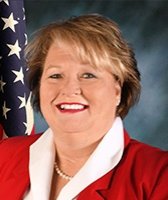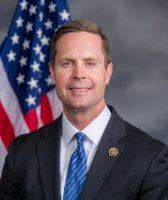Stand up for the facts!
Our only agenda is to publish the truth so you can be an informed participant in democracy.
We need your help.
I would like to contribute

Chris Kennedy speaks at a ribbon cutting ceremony for the new Wolf Point development on June 15 2016 in Chicago, Ill. (Jose M. Osorio/Chicago Tribune/TNS via Getty Images)
Did Chris Kennedy need to add affordable housing at his luxury properties?
Democratic governor candidate Chris Kennedy stoked controversy recently by accusing Chicago Mayor Rahm Emanuel of pushing policies that priced low-income minority residents out of the city.
But Kennedy then found himself attacked for hypocrisy by one of his rivals in the governor’s race. State Sen. Daniel Biss of Evanston claimed Kennedy, a developer, had skirted city affordable housing requirements at Wolf Point West, a downtown luxury high-rise in which Kennedy controls a key stake.
In response, Kennedy told Chicago Sun-Times columnist Mary Mitchell, "there was no requirement to put in affordable housing," saying the Wolf Point property was zoned in 1973, decades before the city implemented its affordable housing ordinance.
"It is nearly impossible when a building is 70 stories tall to create affordable housing because the construction cost itself is probably three times more expensive," Kennedy also said. "We created a river walk. We created a public park. We did all the things that would make us good neighbors and good corporate citizens."
Chicago’s affordable housing ordinance wasn’t enacted until 2003, 30 years after the land was initially zoned, so Kennedy’s claim he was under no legal mandate makes sense on its face. But the property remained largely undeveloped for those 30 years and its zoning was amended by the city in 2013 before construction began on the tower.
Sign up for PolitiFact texts
That made us wonder, could the zoning amendment have triggered requirements to set aside some units for affordable housing? And even if not, is creating affordable housing really as cost-prohibitive as Kennedy says? We decided to take a deeper look.
The land on which the Wolf Point tower stands, purchased by Kennedy’s wealthy investor grandfather in the 1940s, was originally zoned in 1973 as Kennedy said. In the intervening years, the property at the intersection of the Chicago River’s three branches near the Merchandise Mart long was used as a parking facility before plans for the tower got off the ground in 2013.
If Wolf Point was beholden to affordable housing requirements, it would have fallen under the city’s 2007 Affordable Requirements Ordinance, which expanded the original 2003 plan.
Under the 2007 guidelines, new developments with ten or more residential units were required to designate 10 percent of those units as affordable housing or else cough up $100,000 per required unit for the city’s affordable housing fund.
An existing development could have also triggered those requirements by requesting a zoning change that would have increased its density or permitted residential units on a property where such units were not previously allowed.
In 2013, the Chicago City Council amended the zoning plan for the Wolf Point development. Even so, Kennedy’s campaign said the affordable housing rules didn’t apply to Wolf Point because the zoning update did not alter the floor area ratio or character of the development laid out for the property in 1973.
"Since none of those types of changes were being requested, the 2007 ordinance was not required to be adhered to," Kennedy spokeswoman Rebecca Evans said in an email.
She referred us to public zoning records, which show the use of the land today falls in line with the 1973 zoning.
We ran Evans’ assessment by the city’s Department of Planning and Development, which confirmed that the Wolf Point property, by not deviating from its 1973 zoning outline, was grandfathered out of current affordable housing mandates.
Even though Kennedy and his Wolf Point partners faced no legal obligation to add affordable housing, it’s also worth noting in light of his complaints about Emanuel that nothing stopped them from doing it voluntarily.
Developers of similar upscale projects that are subject to the affordable housing mandate have found ways to make compliance economically feasible.
Featured Fact-check
For example, officials at the city Department of Planning and Development pointed to recently approved plans for a 1,011-foot high-rise called One Square Chicago across the street from Holy Name Cathedral. It must adhere to an expanded set of city affordable housing requirements approved in 2015.
Under that mandate, One Square Chicago’s developers plan to rehab 22 units at a cost of $277,000 apiece inside the nearby Lawson House YMCA, a longtime single-room-occupancy residence in a historic art deco building. They’ll also be required to pay an additional $11.37 million into the city affordable housing fund.
The glaring difference between One Square Chicago and Wolf Point, of course, is that developers of the new building had no choice but to comply with the affordable housing requirement, unlike Kennedy and his partners.
Still, Kennedy has cast himself as an affordability advocate, ringing in the new year by alleging, without proof, that the mayor was behind a "strategic gentrification plan" to push out of the city African-Americans and other minorities.
Later, speaking at a debate in Carbondale on Jan. 30, Kennedy evoked the notion that candidates for office should be held accountable to more than just the letter of the law.
"The truth is, just because you don’t break a law doesn’t mean you’re innocent, and we need to hold our elected officials to a higher standard," Kennedy told the audience after lashing out at one of his Democratic rivals.
Kennedy said, "there was no requirement to put in affordable housing" at his Wolf Point development because the property was grandfathered in under rules that applied before adoption of the city’s affordable housing ordinance.
Public records show zoning changes made in 2013, before construction began, did not alter the development in ways that would have triggered the ordinance. And the city department charged with reviewing new projects confirmed that, because of its original zoning date, the development escapes requirements that apply to projects zoned more recently.
Kennedy has made both Chicago affordability and holding candidates to higher standards cornerstones of his campaign. So his own actions are relevant to any exploration of the affordability question.
Nevertheless, Kennedy is correct in stating no legal mandate required him to include affordable housing at his Wolf Point development. We rate his claim True.
Our Sources
MITCHELL: Kennedy’s 2014 speech praising Emanuel raises questions, Chicago Sun-Times, Jan. 16, 2018
Biss, Kennedy Spar Over Affordable Housing in Chicago, NBC Chicago, Jan. 16, 2018
Kennedy accuses Emanuel of 'strategic gentrification plan' to force blacks out of Chicago, Chicago Tribune, Jan. 4, 2018
Email interview, Rebecca Evans, Kennedy campaign, Jan. 25, 2018
Zoning ordinance, Planned Development No. 98, City of Chicago Department of Planning and Development
Email interview, City of Chicago Department of Planning and Development, Jan. and Feb. 1, 2018
Kennedy, Biss question Pritzker's electability, citing Blagojevich ties, Chicago Tribune, Jan. 31, 2018
Affordable Requirements Ordinance guidelines, City of Chicago Department of Planning and Development
Chris Kennedy Slams Same Property Tax System He Used to Get Big Break, Better Government Association, July 12, 2017
Developer, builders group sue city over affordable housing rule, Chicago Tribune, Aug. 28, 2015
Browse the Truth-O-Meter
More by Kiannah Sepeda-Miller
Did Chris Kennedy need to add affordable housing at his luxury properties?
Support independent fact-checking.
Become a member!
In a world of wild talk and fake news, help us stand up for the facts.






















































